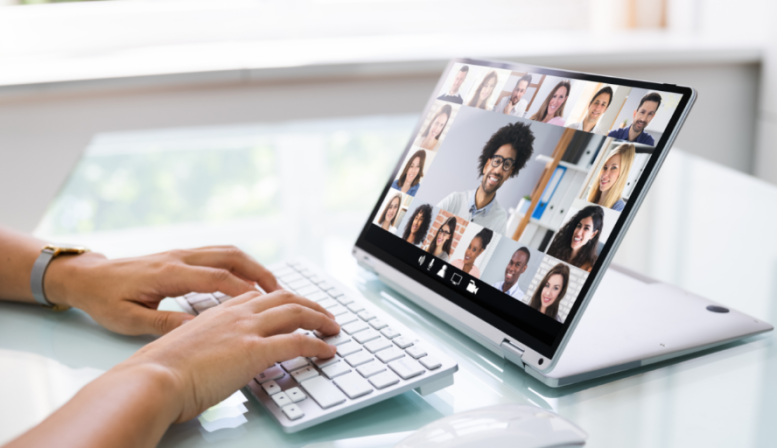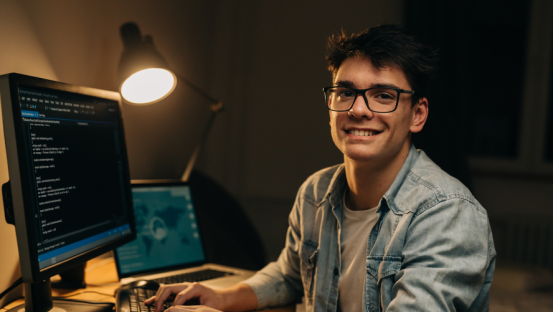Best Online Talks in 2020

2020 has been a year of learning and reimagining the world. Navigating the new normal was one of the biggest challenges of our times, and the virtual world was the only place one could turn to for a bit of help and direction, or simply to connect with others. Luckily, 2020 was also the year that gave us some of the most inspiring online talks of our times that also managed to reach more audiences than before. There is a new level of connectivity in the world and a new sense of sharing and solidarity. Confronted with one common enemy, the mighty C-word which I’ll refrain from naming, the globalized world realized there were a lot more meeting points and commonalities than we expected.
The list of the most-watched and inspiring talks of 2020 is not simply a long list of talks about the pandemic. Surely, it’s difficult not to talk about it when touching on any topic, but there have been other interesting developments in the past year that grabbed people’s attention and captured their imagination as the world stood still in preparation for a major shift.
I have put together a list of the most relevant talks of 2020. They are a good reflection of the Zeitgeist of these unsettling times and will definitely help future generations as well as us, the ones who lived through them, make sense of it all and feel less overwhelmed and, let’s face it, alone in coping.
Certain topics have been particularly relevant in 2020 and certain speakers have made impressive contributions to them. So, here they are.

Hand in hand, business and technology have done what they do best in the past year — drive innovation.
At a time when everything had to change, there was nothing left to do but innovate. The world of business has seen some industries completely reimagined, others decimated, and new ones springing up to meet newly emerging needs.
Businesses have had to redefine their scope of work, the way teams work and the role they play not just in the economy but society at large. No matter how bad the economy has been hit, there is a sense of optimism in the air when we look at what is seen to be the new roaring ‘20s.
The first talk on my list is delivered by tech-futurist Ben Pring in conversation with the head of TED, Chris Anderson. Ben Pring is the co-founder and leader of Cognizant's Center for the Future of Work. Ben is a co-author of the best-selling and award-winning books, What To Do When Machines Do Everything (2017) and Code Halos; How the Digital Lives of People, Things, and Organizations are Changing the Rules of Business (2014). If anyone is prepared for the future, then it’s this guy. If you want to get ready too, watch his talk here.
The second talk is by political theorist Danielle Allen. In the mad rush to restart the economy once the health crisis becomes a thing of the past, Allen underlines the necessity to do so in an ethical manner. “As if this wasn’t a Sisyphic task already”, you’ll hear voices saying. But if we are to get something better out of this crisis instead of a mere return to normal, pausing to think about the ethics of our economic and health systems might not be such a bad idea. Slow down and contemplate a new normal starting with this talk here.

The creative industries have always been more resilient than most and promise to be bouncing back quickly. There is a shift in this arena and it’s not necessarily due to the financial impact. Faced with the pandemic, creatives everywhere started questioning their role in society and how cultural products can reflect or depict what was an almost unrepresentable experience of isolation.
The first talk on the list comes from Beatrice Galilee, co-founder and curator of The World Around, an architecture and design summit, which had its first edition in January 2020 and already the second one this year in residence at the Solomon R. Guggenheim Museum in New York City.
Galilee is dedicated to finding and promoting the most interesting and fascinating stories in the architectural culture of today and she does an amazing job of selecting them too. The entire summit is an impressive collection of speakers and talks on the topic.
But the one I found most fascinating is Beatrice’s talk given in April 2020 for Dezeen’s Virtual Design Festival. She confesses: "Like everybody working in the creative industries now, I'm wondering what to say and what our role is and what we can learn from these extremely complicated times that we're all sharing together." If you’re wondering too, watch her talk here.
The second talk makes a strong case for supporting the creative industries. Ethiopian–American film/television producer, writer, physician and anthropologist, Mehret Mandefro talks about the role of the creative industries in growing economies and preserving democracies. She uses the example of her work in Ethiopia to make the case that a strong creative sector can help the economy grow in two ways: “by bringing production work to Ethiopia and, more importantly, by promoting Ethiopia and its unique cultural assets to the world.”
All those who have had to pitch an idea to investors or justify the importance of their creative work for society at large can find here a great example of a strong argument made by an exceptionally eloquent speaker. You can watch it here.
The last one is a bonus 7-minute talk from Debbie Millman. Millman always makes it on lists like this because she remains relevant, is a great speaker and never fails to inspire. This one is a short talk in which Debbie explores the limits of her own garden during the lockdown in a series of visual, animated letters to the space she rediscovered. It’s particularly interesting because it gives us a peek into Millman’s creative process at a time when even the most resourceful minds were struggling to find inspiration. Watch it here, feel better afterward.

Needless to say, the hot topic in this section has been the development of vaccines. One can almost feel sorry for scientists in any other field whose contributions were likely to go unnoticed as the world had its gaze on medical researchers and, rather impatiently, waited for the development of the COVID-19 vaccine. This crisis has managed to bring hope, but also shed light on some uncomfortable truths about our society. We have learned how medical research can yield immediate outstanding results when unconditionally and generously funded, but also the lack of trust in medical systems, medical research, the pharmaceutical industry, and governments in general.
As vaccination programs are rolled out throughout the globe, governments face the challenge of restoring their people’s trust in their programs. In her talk, anthropologist Heidi Larson addresses the issue of vaccine hesitancy and its cause — rumors. In 2010 she set up the Vaccine Confidence Project to investigate the history of rumors, and tackle the lack of trust in vaccines and the impact it has on immunization in times of crisis. Regardless of how hard researchers work, they don’t operate isolated from their social and political context. Find out how the spread of rumors goes against scientific facts and what we can do about it in her talk here.
The development of new mRNA vaccine technology has set a solid ground for scientists to make the case for further ground-breaking innovation. In his talk, virologist Leor Weinberger talks about how we should develop vaccines that spread and mutate just like viruses do to fight future pandemics more efficiently. Find out all about "hijacker therapy" in his talk.

The health crisis has quickly turned into a mental health crisis as more and more people struggle to cope with anxiety about the virus, isolation, and even economic problems created by the pandemic. While pushed into the background within many health systems grappling with the spread of the virus, mental health has become widely discussed in mass media, on social media and pretty much everywhere people have had a chance to.
This talk by Baruch Fischhoff, PhD, an expert on public perception of risk, human judgment and decision-making is meant to put your mind at ease and give you some tools to handle COVID-19 anxiety as well as tips on how to cope with isolation. While this might come a bit late, as we have all by now learned this the hard way, it’s worth listening to understand how our minds work when faced with the unknown. You can find it on The American Psychologists Association website, here.

Needless to say, this has been the most present topic in talks, newspapers, TV shows, and pretty much every cultural product that came out of 2020. For many, coping with the changes has turned into an effort to intellectualize the situation. Understanding the impact of the pandemic on society at large has become a way to gain some control over what was, frustratingly, out of everyone’s control.
The year started with one of Bill Gates’ older talks warning us about the risks of a pandemic hitting an increasingly global society. For some, a wise prophet, for others the mastermind behind the pandemic, Bill Gates was one of the most respected or despised, but most certainly most listened to voices of 2020.
Recorded in March 2020 in the early days of the pandemic, Gates’ talk offers solutions to overcoming the crisis which may now sound pretty obvious, but at the time everyone was reluctant to accept. Self-isolation was often the last resort for governments struggling to grapple with the fact that the economy will have to be sacrificed in the short term for better results in the long run. A year on, this seems like an obvious solution, but it was surely controversial and difficult for most to accept as the only way out at the time.
You can watch the talk here.
As vaccines appear and restrictions ease in some countries, others are still being badly affected by second, even third waves of the virus. Forecasts are still bleak, and most virologists and experts in the field predict we might see more of this happening in the future. With more pandemics on the horizon, investment in health systems becomes imperative. If you want to understand what it takes to create such medical systems and how far we are from an ideal that can cope in times of a pandemic, this talk gathers medical experts to discuss how to build more resilient health systems, and what this pandemic has taught us.
The talk was hosted by The Academy of Medical Sciences, UK and you can watch it here.

It’s impossible to talk about the pandemic without looking at the causes. Many climate experts have warned that the pandemic is just another side-effect of the impact humans have had on the environment and, by now almost uncontrollable, global warming.
There has been one person that has been at the forefront of discussions around climate change and actively campaigned for urgent action — Greta Thunberg. In January 2020 at the World Economic Forum, she delivered an inspiring talk that should have made many of the adults around her lower their heads in shame. Greta’s talk has reached far and wide and she has since become one of the main figures in the fight against climate change, giving “grown-ups” something to think about and making them reconsider their lifestyles and how they might affect their children’s future. Whether the responses she got at the time of her talk were genuine is still to be seen, but one thing is certain: Greta Thunberg is a great speaker, not only because of the passion with which she delivers her message but also because of the extended research she does on the topic and the undeniable facts she presents to make her case.
You can and should watch her talk here.
In a pragmatic way, the next talk looks at climate change as the impending doom, and proposes ways to handle the displacement of millions of people that will inevitably be required as ocean levels continue to rise. Colette Pichon Battle is a lawyer from Louisiana, a place that in recent years has seen a wave of climate change related natural disasters resulting in communities being displaced and numerous lives being lost. She has dedicated herself to fighting for human rights for communities on the frontline of the struggle against climate change. In her work, she points to the fact that some will see climate change sooner than others, but that does not mean it will not eventually affect us all.
You can watch Pichon Battle’s talk here.

As black and minority communities were hit harder by the pandemic, and the revelations of systemic racism culminated with the death of George Floyd in the US, another issue took center stage amid the pandemic: racism and racial inequality. Protests erupted all over the world and an entire discussion was sparked around how to go about combating systemic racism.
The first one to watch on this list is Jennifer Lynn Eberhardt. Eberhardt is an African-American social psychologist, currently a professor in the Department of Psychology at Stanford University. Over the years she has done extensive research on the association between race and crime and the biases that lead to systemic racism. Her 2020 TED talk focuses on defining and identifying racial bias as well as offering solutions to fight against it. If you want to get educated in this respect and watch a brilliant speaker at work, this is a good place to start.
Link to talk here.
The second one is Dr. Kimya Nuru Dennis, founder and owner of 365 Diversity, LLC, an organization working to raise awareness around demographic and cultural disparities and injustices and find ways to overcome them. She is the author of “Black Male Suicide: Inward Expressions of Social Status and Status Frustration" and numerous other articles on the intersection between race and gender, and a brilliant speaker as well.
You can watch her talk about race, gender, social inequalities, and racial biases here.

Probably the most uttered and shared slogan of 2020, We’re all in this together has quickly become empty rhetoric as we’ve watched poorer countries and even communities within rich Western countries being affected by the health crisis worse than others.
The topic of social justice has therefore remained a current one as what was supposed to be a nondiscriminatory virus that affected us all the same, has exposed and deepened the disparities in society even further.
Kwame Owusu Kesse is the CEO of Harlem Children's Zone, a non-profit organization that fights to end intergenerational poverty in Harlem. As the communities in the neighborhood were struggling to deal with the economic implications of the pandemic, Harlem Children's Zone started developing a strategy to help families in need. His talk presents the five needs that every response to a health crisis should meet and offers solutions on how to take their local strategy to a national level. This is the kind of talk that will help you see a light at the end of a dark tunnel and you can watch it here.
These brilliant speakers have brought sometimes uncomfortable topics to the world’s attention, not only illuminating current issues in society but also demonstrating how the need to educate ourselves is more pressing than ever before as we slowly move past a crisis and into rebuilding our society.







